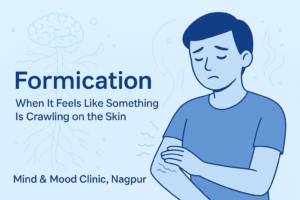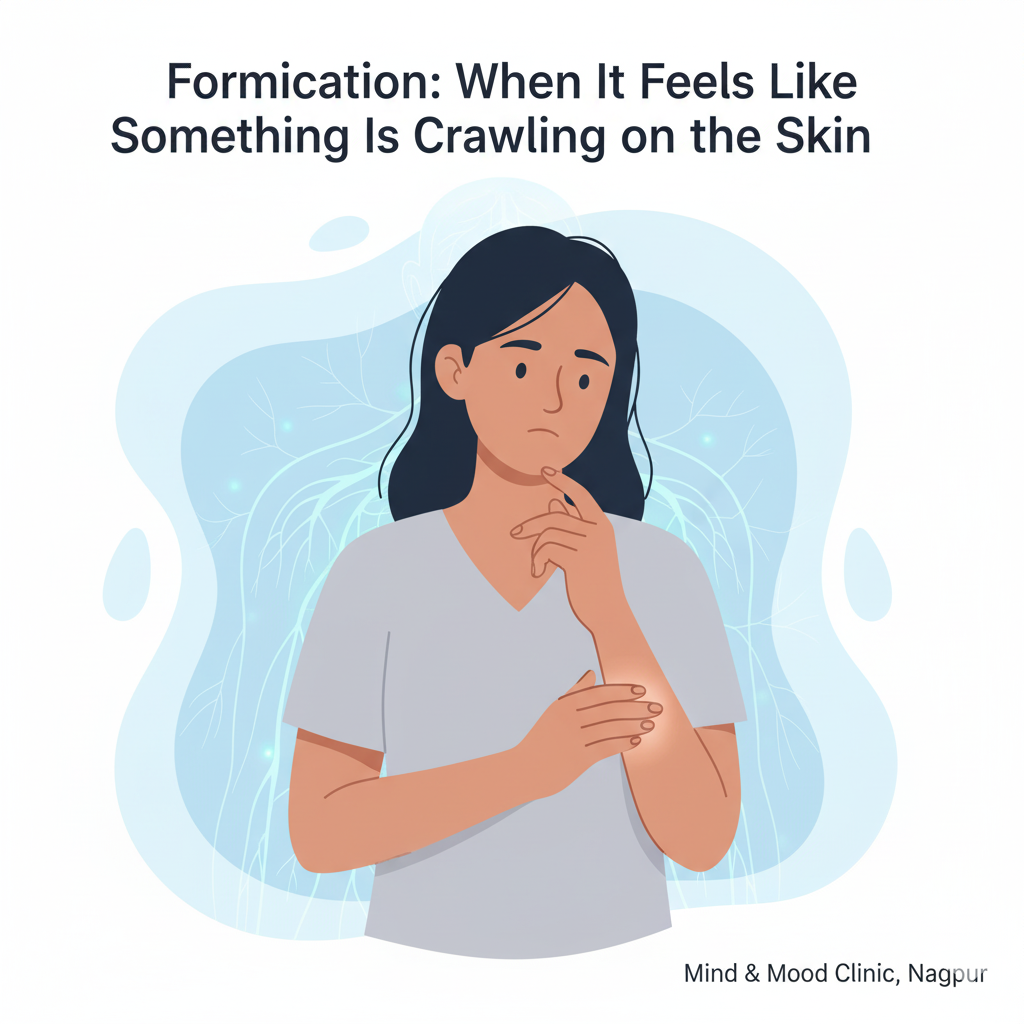Formication is a medical term that describes the sensation of insects or tiny creatures crawling on or under the skin — even when nothing is there.
People may describe it as:
“It feels like ants are moving on my arms.”
“Something is biting or crawling, but I can’t see anything.”
This experience can be very distressing and often makes patients anxious, restless, or embarrassed to share what they’re feeling. But remember — you’re not imagining it or “going mad.” Formication is a real sensory symptom, and it has many possible causes, both medical and psychological.
🔍 Why Does Formication Happen?

Formication occurs when nerve signals in the skin and brain get mixed up. Normally, your nerves send accurate touch sensations — warmth, pressure, vibration, etc.
But when these signals become overactive or irritated, the brain misinterprets them as crawling, tingling, or itching — even in the absence of any real insects.
This can happen due to:
🧩 1. Neurological or Medical Causes
- Vitamin B12 deficiency: Low B12 levels affect nerve function, causing tingling or crawling sensations.
- Diabetes: High blood sugar can damage nerves (neuropathy), leading to abnormal sensations.
- Menopause or hormonal imbalance: Changes in estrogen can make the skin feel more sensitive or itchy.
- Drug or alcohol withdrawal: Stopping certain substances (like alcohol, cocaine, or amphetamines) may trigger formication during detox.
- Certain medications: Some antidepressants, antipsychotics, or painkillers can rarely cause similar sensations.
- Skin conditions: Eczema, dry skin, or allergies may worsen the perception.
💭 2. Psychiatric or Stress-Related Causes
Formication can also appear as part of mental health conditions like:
- Anxiety or panic disorder: Stress hormones overstimulate the nerves, making the skin feel alive or prickly.
- Depression: Chronic stress alters serotonin and dopamine, leading to sensory misinterpretations.
- Delusional parasitosis (Ekbom’s Syndrome): The firm belief that insects are under the skin, despite medical reassurance.
- Schizophrenia or psychosis: Rarely, hallucinations involving touch (tactile hallucinations) can include crawling sensations.
In psychiatry, these sensations are treated gently — not as “imagination,” but as a signal from the brain that something deeper is out of balance.
🧠 What Happens in the Brain?
Let’s simplify the science:
Your skin has millions of nerve endings. These nerves send messages to your somatosensory cortex (the brain’s “touch center”).
If those nerves become irritated (due to stress, drugs, or nerve damage), they send false signals — and your brain interprets it as movement or crawling.
In some psychiatric conditions, dopamine activity in the brain can increase, which amplifies sensory experiences and makes them feel vivid or real.
That’s why medication and therapy help — they calm those overactive brain circuits, bringing back balance and peace.
⚕️ How Is Formication Diagnosed?
Diagnosis requires a gentle, thorough evaluation — not guesswork.
At Mind & Mood Clinic, Nagpur, we start by:
- Medical check-up — to rule out skin or nerve-related causes.
- Blood tests — for Vitamin B12, sugar levels, thyroid, and hormones.
- Medication review — to see if any drug might be contributing.
- Psychiatric assessment — to understand if stress, anxiety, or psychosis is playing a role.
This process ensures no cause is missed — and treatment targets the real source of the problem.
💊 Treatment Options
Treatment depends on the underlying cause — often, it’s a combination of medical and psychological care.
🔹 1. If Medical Cause Found:
- Vitamin B12 injections or supplements
- Blood sugar control in diabetes
- Stopping or changing any triggering medication
- Skin moisturizers and antihistamines if itching is present
🔹 2. If Psychological or Stress-Related:
- Anti-anxiety or antidepressant medications (SSRIs or SNRIs) can stabilize nerve activity and reduce sensations.
- Antipsychotic medicines (if delusional parasitosis or psychosis is suspected) help rebalance brain dopamine and relieve tactile hallucinations.
- Therapy / Counselling: Especially CBT (Cognitive Behavioural Therapy) helps patients identify stress triggers and calm their sensory focus.
- Relaxation techniques: Breathing, grounding, and mindfulness reduce body tension and nerve overactivity.
🌱 Lifestyle & Self-Care Tips
✅ Sleep: Maintain 7–8 hours of regular sleep to help nerve recovery.
✅ Nutrition: Eat foods rich in Vitamin B12 (milk, eggs, fish, fortified cereals).
✅ Hydration: Drink enough water and avoid excessive caffeine.
✅ Exercise: 30 minutes of brisk walking or yoga daily improves blood flow and nerve health.
✅ Stress management: Meditation, music, journaling, or light hobbies help.
✅ Avoid scratching or self-treating: This can injure skin and worsen sensations.
🧘♀️ Affirmations You Can Use
When the crawling sensation starts or anxiety builds up, repeat calmly:
“This is a false signal from my nerves. It will pass.”
“I am safe, calm, and in control.”
“My body is healing, and I’m helping it by staying peaceful.”
🩺 When to Seek Help
Please visit a psychiatrist or neurologist if:
- The crawling sensation is constant or worsening
- You can’t sleep or concentrate because of it
- You start feeling others won’t believe you
- You’ve already tried skin treatments with no relief
Getting help early prevents distress and avoids unnecessary suffering.
With proper treatment, most people recover completely — once the underlying cause is corrected, the false nerve signals fade away.
💬 Final Message from Dr. Rameez Shaikh
“Formication can feel scary, but it’s just your nerves sending wrong messages — not a sign of madness or insects.
With right treatment, therapy, and patience, these sensations calm down, and life returns to normal.
The key is to seek help early and trust the process.”
📍 Mind & Mood Clinic, Nagpur
👨⚕️ Dr. Rameez Shaikh, MD (Psychiatrist & Counsellor)
📞 +91-8208823738 🕒 Timings: 10 AM – 2 PM (By Appointment Only)

Dr. Rameez Shaikh (MBBS, MD, MIPS) is a consultant Psychiatrist, Sexologist & Psychotherapist in Nagpur and works at Mind & Mood Clinic. He believes that science-based treatment, encompassing spiritual, physical, and mental health, will provide you with the long-lasting knowledge and tool to find happiness and wholeness again.
Dr. Rameez Shaikh, a dedicated psychiatrist , is a beacon of compassion and understanding in the realm of mental health. With a genuine passion for helping others, he combines his extensive knowledge and empathetic approach to create a supportive space for his patients.
